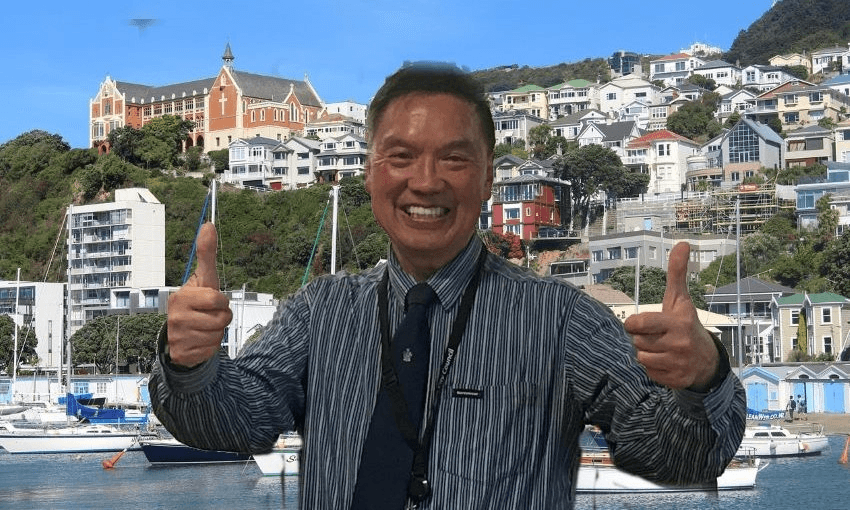Ray Chung is running for mayor. Who is he, and does he have a chance? Wellington editor Joel MacManus talks to the city councillor for the second edition of Windbag, The Spinoff’s Wellington issues column.
Are we doing this already? The 2025 local body elections are 17 months away, but the race for Wellington mayor has already begun. Incumbent Tory Whanau has confirmed she will run for re-election and now rightwing councillor Ray Chung has officially thrown his hat in the ring too.
In last week’s Windbag, I looked at Tory Whanau’s mayoralty so far and her chances of re-election. So let’s have a look at who she is up against. Is Ray Chung a serious contender? Yes. Is he a serious person? That’s a harder question.
If you cast your mind back to the sunny days of 2022, the general media narrative was that the Wellington mayoral race was a three-horse race between Tory Whanau, Paul Eagle and Andy Foster, with Labour MP Eagle as the early favourite. The election day results proved that narrative wrong. Whanau received more votes than the other two combined. And it turns out there was a fourth horse all along. First-time candidate Ray Chung was only 113 votes behind Paul Eagle for fourth place in the final STV iteration. It’s an impressive result, especially because he admitted he wasn’t running a proper mayoral campaign. He just wanted to raise his profile as a council candidate in the Onslow-Western ward (which he won).
Chung’s electoral superpower is his inexhaustible energy. He replies to every email, knocks on every door, shows up to every local event, and asks questions about every public submission. He also feeds a lot of stories to media and does a lot of interviews. This makes him highly visible, which is valuable in local politics when most people barely know the names of their councillors. It could be a key advantage for him in a race against Tory Whanau, who isn’t as much of a natural extrovert.
He brings the same tenacious enthusiasm to the council table, but sometimes lacks the political awareness to do much with it. He hasn’t learnt some of the basic meeting processes, like when you can put up amendments and when you can ask questions. During the final District Plan meeting, he was caught giving a speech written by heritage advocate Felicity Wong, the chair of Historic Places Wellington (the email was still open on his screen).
Sometimes, he seems to speak without thinking, like his mouth is moving faster than his mind. He badmouths other councillors in a much more overt way than you typically see in local politics. In council meetings, he’ll sometimes repeat questions that have just been asked or ask about irrelevant things. Council insiders describe him as inconsistent; some days he is razor-sharp, picking apart minor details of documents, and other days he doesn’t seem to know what is going on.
In a phone interview, Chung said he thought other councillors didn’t listen to him, and that council staff were hiding information from him. “They’re not going to consider input from me. What’s the point of being here if I’m not going to be listened to?” He said he wasn’t enjoying his job as a councillor so far. “In my old job, 90% of my days would be good days. In council, I’m lucky I go through even 5% of the days feeling good. I finish the day feeling frustrated and annoyed about what I have achieved. I’m not getting that sense of satisfaction from a day in the council.”
(Chung previously worked in sales for international infrastructure and telecommunications projects. It’s easy to see why he was a successful salesman; he’s persistent as hell.)
If he wins the mayoralty, he hopes he will get his way more often. But he said he might stand down as mayor if he didn’t get the council he wanted. If he was in Andy Foster’s position as a rightwing mayor with a leftwing council he would “feel frustrated going to work every day. If you’re not happy doing what you’re doing, you shouldn’t do it. So it wouldn’t do me or the city any good if that was me.”
For his top issues, he thought the council needed to do a better job of consulting and listening to the community, and that he wanted to cut spending on “nice-to-have” projects (he likes cycle lanes but thought the council was “going mad on them”). He is basically a small government conservative who wants big cuts to services to save money, but he doesn’t hold that position particularly consistently. He voted to spend an extra $147m repairing the Town Hall, and campaigned to keep the heavily subsidised Khandallah Pool.
In fact, he doesn’t hold many positions consistently; he kicked up a fuss because he was left off the mayor’s diplomatic trip to Asia, but voted against deputy mayor Laurie Foon going to Singapore to accept an award on behalf of the council (even though the flights were not paid for by ratepayers). Earlier in the term, he complained about MPs giving political speeches at council venues, but then was in favour of allowing the anti-trans Inflection Point group to host an event at council-owned Tākina conference centre. Insiders describe him as malleable. His vote can swing based on who spoke to him last.
By announcing his candidacy so early, Chung has the chance to coalesce support and become the leading challenger on the right. He will probably run an extremely effective campaign for his base, but it’s more doubtful whether he can win over the centre. The question for the right-leaning donors and business groups is whether to get behind him, or hold on and hope for someone better.



